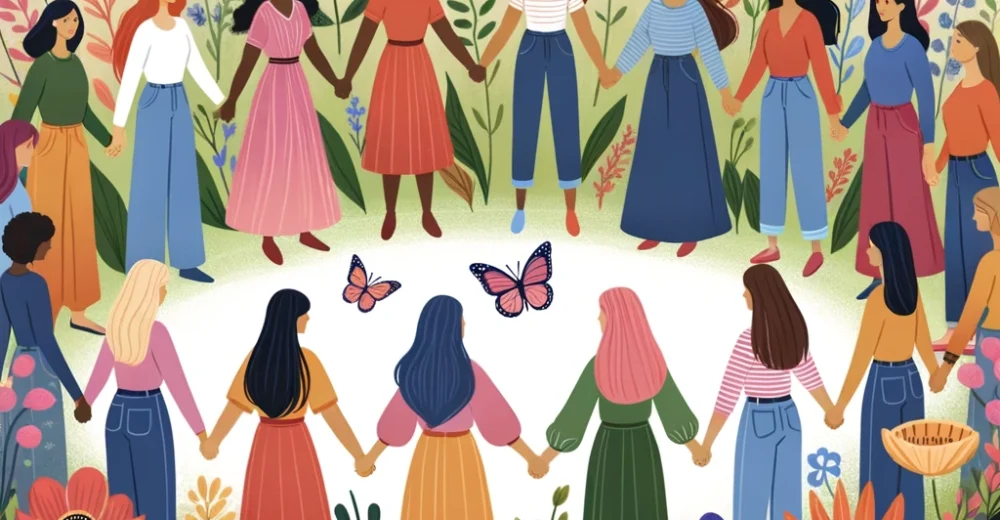Table of Contents
Building and nurturing meaningful relationships is a crucial aspect of life. These relationships, whether they are romantic, familial, or platonic, provide us with a sense of belonging, love, and support. They contribute significantly to our overall well-being and happiness. The importance of these relationships cannot be overstated, as they not only enrich our lives but also help us grow as individuals.
Strong connections in various aspects of life offer numerous benefits. They provide emotional support during tough times, offer guidance and advice, and bring joy and happiness. Moreover, they can also contribute to our professional success by expanding our network and opening up new opportunities. Therefore, investing time and effort in building and nurturing these relationships is essential.
This comprehensive guide aims to provide you with insights and strategies to build and nurture meaningful relationships. It covers various aspects, including understanding love languages, maintaining independence, attraction psychology, effective communication, and much more. So, let’s dive in and explore these topics in detail.
Understanding Love Languages
The concept of love languages was introduced by Dr. Gary Chapman in his book “The Five Love Languages”. According to him, each person has a primary love language that they use to express love and feel loved. These languages are Words of Affirmation, Acts of Service, Receiving Gifts, Quality Time, and Physical Touch. Understanding these languages can significantly impact your relationships.
Identifying your own and your partner’s love language can help improve your communication and deepen your connection. For instance, if your love language is Words of Affirmation, you feel loved when your partner expresses their love verbally. On the other hand, if your partner’s love language is Acts of Service, they feel loved when you do things for them, like cooking a meal or cleaning the house.
Communicating effectively in each love language requires understanding and effort. Here are some tips:
- Words of Affirmation: Express your love verbally, write a love note, or give compliments.
- Acts of Service: Do something for your partner that they would appreciate.
- Receiving Gifts: Give thoughtful gifts that show you know and understand your partner.
- Quality Time: Spend uninterrupted time with your partner, doing something you both enjoy.
- Physical Touch: Show affection through hugging, holding hands, or cuddling.
Maintaining Independence in Relationships
Maintaining individuality in a relationship is crucial for its health and longevity. While it’s important to share common interests and spend quality time together, it’s equally important to have your own hobbies, interests, and friends. This not only allows you to maintain your identity but also keeps the relationship interesting and dynamic.
Challenges can arise when boundaries are not respected in a relationship. This can lead to feelings of suffocation, resentment, and loss of identity. Therefore, it’s essential to establish and respect each other’s boundaries. This could be about personal space, time spent with friends, or even about sharing personal information.
Striking a balance between independence and togetherness can be tricky, but it’s not impossible. Here are some strategies:
- Respect each other’s personal space and time.
- Have separate hobbies and interests.
- Encourage each other’s personal growth and development.
- Communicate openly about your needs and expectations.
Attraction Psychology: The Science Behind Relationships
Attraction is a complex phenomenon influenced by various psychological factors. These include physical appearance, personality traits, and shared interests. Understanding these factors can help you enhance attraction and build a strong foundation for your relationship.
Physical appearance often plays a significant role in initial attraction. However, as the relationship progresses, personality traits and shared interests become more important. Traits like kindness, humor, and intelligence, and shared interests like hobbies, beliefs, and values, can significantly contribute to long-term attraction.
Here are some practical tips for enhancing attraction:
- Take care of your physical appearance.
- Develop and showcase your personality traits.
- Find and share common interests.
- Communicate openly and honestly.
Effective Communication Strategies
Communication is the bedrock of any meaningful relationship. It allows us to express our feelings, needs, and expectations, and helps us understand our partner better. Effective communication involves not just talking but also listening actively to your partner.
Active listening involves fully focusing on your partner, understanding their message, and responding thoughtfully. It shows your partner that you value their thoughts and feelings. Non-verbal cues, like eye contact, body language, and tone of voice, also play a crucial role in communication. They can often convey more than words can.
Conflict resolution is another essential aspect of communication. Conflicts are inevitable in any relationship, but how you handle them can make all the difference. Here are some strategies:
- Listen to your partner’s perspective without interrupting.
- Express your feelings and needs honestly and respectfully.
- Try to find a compromise or solution that works for both of you.
Building Trust and Intimacy
Trust and intimacy are the pillars of a meaningful relationship. They foster a safe and supportive environment where both partners can express themselves freely and be their authentic selves. Building trust and intimacy requires time, effort, and patience.
Trust is built through consistent and reliable behavior. It involves being honest, keeping your promises, and showing respect for your partner. Intimacy, on the other hand, involves sharing your thoughts, feelings, and experiences with your partner. It requires vulnerability and openness.
Here are some tips for building trust and intimacy:
- Be honest and transparent with your partner.
- Keep your promises and commitments.
- Share your thoughts, feelings, and experiences with your partner.
- Show empathy and understanding towards your partner.
Overcoming Relationship Challenges
Every relationship faces challenges at some point. These could be due to jealousy, trust issues, communication breakdowns, or other factors. However, these challenges can be overcome with understanding, communication, and effort.
Jealousy can often stem from insecurity or fear of losing your partner. It’s important to communicate your feelings to your partner and work on building trust and security in your relationship. Trust issues, on the other hand, can be resolved by being honest, reliable, and consistent in your actions.
Communication breakdowns can be overcome by practicing active listening, expressing your feelings and needs clearly, and resolving conflicts in a respectful and constructive manner. Here are some strategies:
- Communicate openly and honestly about your feelings and concerns.
- Work on building trust and security in your relationship.
- Practice active listening and respectful conflict resolution.
Cultivating Emotional Intelligence
Emotional intelligence is the ability to understand and manage your own emotions and those of others. It involves self-awareness, empathy, and emotional regulation. Cultivating emotional intelligence can significantly improve your relationships.
Self-awareness involves understanding your own emotions, strengths, weaknesses, and needs. It allows you to manage your emotions effectively and respond to your partner in a thoughtful and considerate manner. Empathy, on the other hand, involves understanding and sharing your partner’s feelings. It fosters a sense of connection and understanding in the relationship.
Emotional regulation involves managing your emotions in a healthy and constructive manner. It prevents emotional outbursts and helps maintain harmony in the relationship. Here are some techniques to develop emotional intelligence:
- Practice mindfulness and self-reflection.
- Try to understand and share your partner’s feelings.
- Manage your emotions in a healthy and constructive manner.
Balancing Work and Relationships
Balancing career aspirations and personal relationships can be challenging. However, it’s essential for maintaining a healthy work-life balance and nurturing your relationships. It involves prioritizing your time and managing it effectively.
Work can often take up a significant portion of our time and energy, leaving little for our personal relationships. However, it’s important to make time for your partner and nurture your relationship. This not only strengthens your bond but also provides you with the emotional support and happiness that can enhance your work performance.
Here are some tips for balancing work and relationships:
- Set clear boundaries between work and personal time.
- Make time for your partner and nurture your relationship.
- Communicate openly about your work commitments and expectations.
- Seek a balance between your career aspirations and relationship needs.
The Role of Boundaries in Healthy Relationships
Boundaries are essential for maintaining a healthy and respectful relationship. They define what is acceptable and what is not in a relationship, and help protect your individuality and well-being. Setting and respecting boundaries can significantly improve your relationship dynamics.
Boundaries can be physical, emotional, or mental. Physical boundaries involve personal space and physical touch. Emotional boundaries involve your feelings and emotions. Mental boundaries involve your thoughts, values, and beliefs. Understanding these boundaries and respecting them can foster a sense of respect and understanding in the relationship.
Here are some tips for establishing and communicating boundaries effectively:
- Understand your own boundaries and respect your partner’s.
- Communicate your boundaries clearly and assertively.
- Respect your partner’s boundaries and expect the same in return.
Nurturing Long-Distance Relationships
Long-distance relationships present unique challenges. However, with effort and commitment, these challenges can be overcome. The key is to maintain a strong connection and intimacy, despite the physical distance.
Communication is crucial in a long-distance relationship. It helps maintain a sense of connection and intimacy. Regular video calls, messages, and virtual dates can help keep the spark alive. It’s also important to manage expectations and be understanding of each other’s schedules and commitments.
Here are some tips for nurturing a long-distance relationship:
- Communicate regularly and openly.
- Plan virtual dates and activities.
- Manage expectations and be understanding of each other’s schedules.
- Visit each other as often as possible.
The Power of Forgiveness and Healing
Forgiveness is a powerful tool for resolving conflicts and healing emotional wounds. It involves letting go of resentment and anger, and moving forward with understanding and compassion. Forgiveness can significantly improve your relationship and overall well-being.
Forgiving someone doesn’t mean condoning their actions. It means choosing to let go of the negative emotions associated with their actions and moving forward. It’s not always easy, but it’s necessary for healing and growth.
Here are some tips for practicing forgiveness:
- Understand the hurt and acknowledge your feelings.
- Choose to let go of resentment and anger.
- Communicate your feelings and decision to forgive.
- Seek professional help if necessary.
Building a Supportive Network
Having a strong support system outside of your romantic relationship is crucial for your overall well-being. It provides you with additional emotional support, guidance, and companionship. Friends and family can offer a different perspective and help you navigate through life’s challenges.
Building a supportive network involves nurturing your existing relationships and forming new ones. It involves spending quality time with your friends and family, showing interest in their lives, and offering your support when they need it. It’s a two-way street that requires effort and commitment.
Here are some tips for building a supportive network:
- Spend quality time with your friends and family.
- Show interest in their lives and offer your support.
- Form new relationships based on common interests and values.
Embracing Vulnerability in Relationships
Vulnerability is the key to emotional intimacy in a relationship. It involves opening up to your partner and sharing your thoughts, feelings, and fears. While it can be scary, embracing vulnerability can foster a deeper connection and understanding in your relationship.
Common fears associated with vulnerability include fear of rejection, judgment, and getting hurt. However, in a safe and supportive relationship, vulnerability is embraced and valued. It allows both partners to be their authentic selves and fosters a sense of closeness and understanding.
Here are some tips for embracing vulnerability:
- Open up to your partner about your thoughts, feelings, and fears.
- Be supportive and understanding when your partner opens up.
- Create a safe and supportive environment for emotional intimacy.
Conclusion
Building and nurturing meaningful relationships is a journey, not a destination. It requires effort, patience, and understanding. However, the rewards are well worth it. Strong and meaningful relationships not only enrich our lives but also contribute to our personal growth and happiness.
This comprehensive guide has provided you with insights and strategies to build and nurture meaningful relationships. Whether it’s understanding love languages, maintaining independence, enhancing attraction, or embracing vulnerability, each aspect plays a crucial role in fostering strong and lasting relationships.
We encourage you to implement these strategies and tips in your relationships. Remember, every relationship is unique, and what works for one might not work for another. So, be patient, keep learning, and keep growing. For further exploration, you can refer to additional resources or recommended readings.










